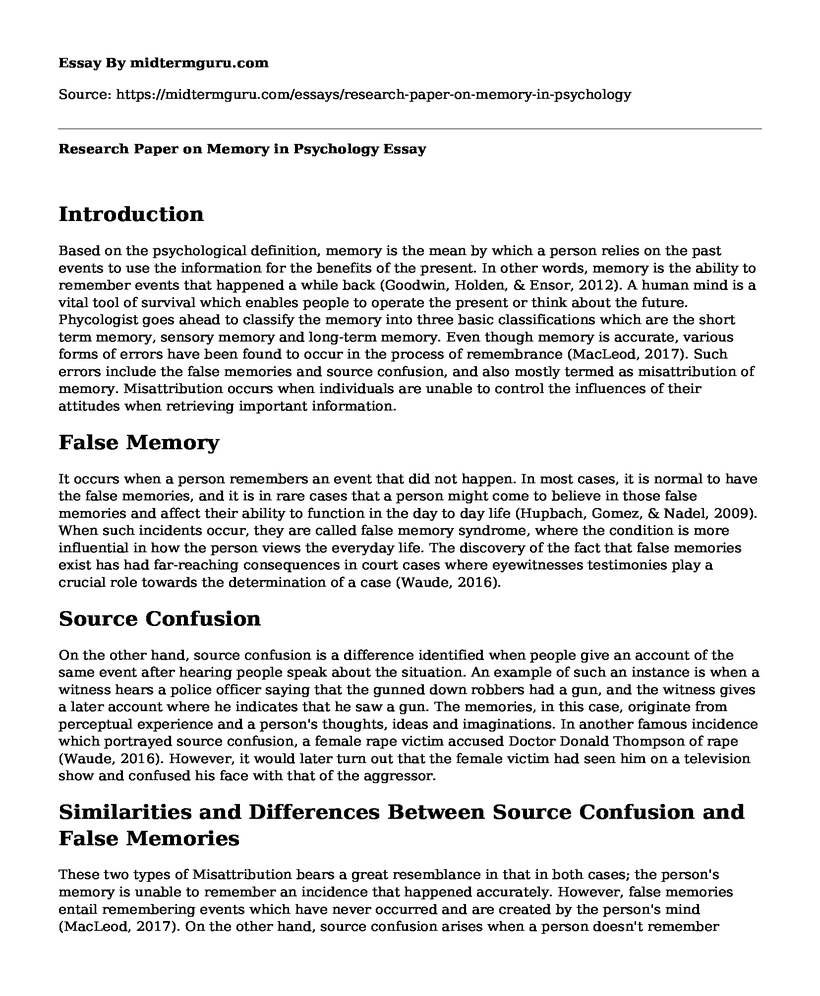Introduction
Based on the psychological definition, memory is the mean by which a person relies on the past events to use the information for the benefits of the present. In other words, memory is the ability to remember events that happened a while back (Goodwin, Holden, & Ensor, 2012). A human mind is a vital tool of survival which enables people to operate the present or think about the future. Phycologist goes ahead to classify the memory into three basic classifications which are the short term memory, sensory memory and long-term memory. Even though memory is accurate, various forms of errors have been found to occur in the process of remembrance (MacLeod, 2017). Such errors include the false memories and source confusion, and also mostly termed as misattribution of memory. Misattribution occurs when individuals are unable to control the influences of their attitudes when retrieving important information.
False Memory
It occurs when a person remembers an event that did not happen. In most cases, it is normal to have the false memories, and it is in rare cases that a person might come to believe in those false memories and affect their ability to function in the day to day life (Hupbach, Gomez, & Nadel, 2009). When such incidents occur, they are called false memory syndrome, where the condition is more influential in how the person views the everyday life. The discovery of the fact that false memories exist has had far-reaching consequences in court cases where eyewitnesses testimonies play a crucial role towards the determination of a case (Waude, 2016).
Source Confusion
On the other hand, source confusion is a difference identified when people give an account of the same event after hearing people speak about the situation. An example of such an instance is when a witness hears a police officer saying that the gunned down robbers had a gun, and the witness gives a later account where he indicates that he saw a gun. The memories, in this case, originate from perceptual experience and a person's thoughts, ideas and imaginations. In another famous incidence which portrayed source confusion, a female rape victim accused Doctor Donald Thompson of rape (Waude, 2016). However, it would later turn out that the female victim had seen him on a television show and confused his face with that of the aggressor.
Similarities and Differences Between Source Confusion and False Memories
These two types of Misattribution bears a great resemblance in that in both cases; the person's memory is unable to remember an incidence that happened accurately. However, false memories entail remembering events which have never occurred and are created by the person's mind (MacLeod, 2017). On the other hand, source confusion arises when a person doesn't remember where specific memories come from. Another difference is that based on research done, source confusion is triggered by the perirhinal cortex part of the brain which is involved in the source information (Hupbach, Gomez, & Nadel, 2009). The part of the brain which is involved in the false memories is the frontal lobe which plays a crucial role in the monitoring of the memories. Damage in the frontal lobe has been associated with high levels of false recognition.
Conclusion
In conclusion, both false memories and source confusion are vital areas that need more study and research to understand the human psychology. Determining incidences where witnesses are facing these types of errors can help in the courts and gathering of evidence. Nonetheless, future studies should be focused on how to eliminate these types of errors in human memory and thus be able to give accurate and consistent information.
References
Goodwin, K. A., Holden, L. R., & Ensor, K. M. (2012). Working Memory, Source Monitoring and False Memory: An Individual Differences Perspective. PsycEXTRA Dataset. doi:10.1037/e502412013-813
Hupbach, A., Gomez, R., & Nadel, L. (2009). Episodic memory reconsolidation: Updating or source confusion? Memory, 17(5), 502-510. doi:10.1080/09658210902882399
MacLeod, A. (2017). Memory. Oxford Clinical Psychology. doi:10.1093/med:psych/9780198725046.003.0006
Waude, A. (2016, January 15). How False Memories Can Affect Our Ability To Recall Events. Retrieved from https://www.psychologistworld.com/memory/false-memories-questioning-eyewitness-testimony. Accessed 14th September 2018
Cite this page
Research Paper on Memory in Psychology. (2022, Aug 08). Retrieved from https://midtermguru.com/essays/research-paper-on-memory-in-psychology
If you are the original author of this essay and no longer wish to have it published on the midtermguru.com website, please click below to request its removal:
- Letter to Time Magazine Regarding the Choice for the Person of the Decade - Paper Example
- Annotated Bibliography: Obsessive-Compulsive Disorder and Obsessive-Compulsive Personality Disorder
- Paper Example on Behavioral Therapy
- Personality Across a Lifespan - Essay Sample
- Understanding Human Behavior and Its Relationship to Family Bonds - Essay Sample
- Trauma: A Distressing Mental Health Phenomenon - Essay Sample
- Paxil: Antidepressant Prescription to Treat Anxiety Disorders and Stress - Essay Sample







